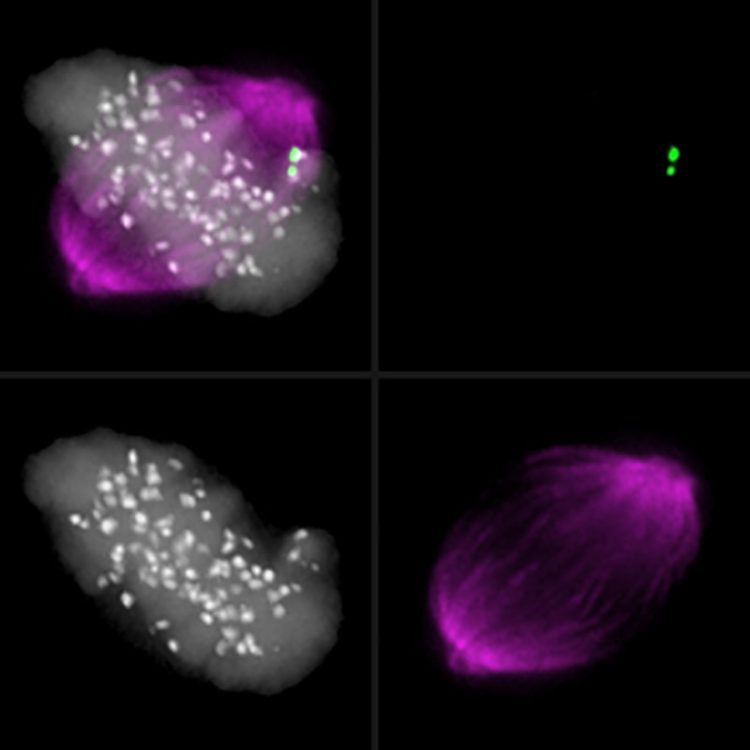Two are better than one – another checkpoint enzyme for flawless cell division

Mitotic spindle apparatus preparing for chromosome segregation: an unaligned chromosome activates the checkpoint (green) and thereby prevents premature segregation. © University of Basel, Biozentrum
Each day, the cells of the human body divide billions of times; this also requires duplication of their genetic information. Errors in cell division can cause tumor formation, and an exact segregation of the DNA (chromosomes) is therefore essential to ensure the health of the whole organism.
Prof. Erich Nigg’s research group at the Biozentrum, University of Basel, has demonstrated that the enzyme Plk1 plays a significant role in monitoring the segregation of chromosomes.
Plk1 has checkpoint function
The segregation of the 23 chromosome pairs of human cells only occurs when all parameters are correct. This is ensured by a surveillance process, a so-called checkpoint. Central to this checkpoint is an inhibitor formed on the chromosomes, called mitotic checkpoint complex (MCC), which prevents cell division until all settings on the mitotic spindle, the chromosome segregation apparatus, are correct.
“Just like the enzyme Mps1, Plk1 also ensures the assembly of the MCC and finally the inhibition of cell division,” says the first author Conrad von Schubert. “Plk1 thus also has a checkpoint function and consequently safeguards chromosome segregation.”
In the past, various functions have been attributed to the enzyme Plk1, including the correct assembly and disassembly of the mitotic spindle. “The newly uncovered checkpoint function of Plk1 had been overlooked, however, since other functions obscured this phenomenon,” explains Conrad von Schubert.
The research team could now demonstrate that Plk1 influences the inhibitor MCC via at least two pathways. In a nutshell, Plk1 supports the enzyme Mps1, whose checkpoint function had already been known for some time. “Plk1 ensures rapid and robust checkpoint activation by acting in a similar way to Mps1, thus reinforcing Mps1 activity,” says Conrad von Schubert.
Plk1 demonstrates evolutionary stability
“While Plk1 and Mps1 cooperate in human cells, Plk1 has prevailed over Mps1 during the evolution of other organisms,” remarks Conrad von Schubert. Because Mps1 has disappeared in the nematode Caenorhabditis elegans, Plk1 has taken over the entire checkpoint function in this organism, as shown by an independent study in the same issue of the journal.
Combined drugs against cancer?
Mps1 is currently being investigated as a possible target for the treatment of cancer. “However, the fact that Plk1 also exhibits checkpoint function during cell division was not known,” says Conrad von Schubert. The new findings suggest that both enzymes should be considered as targets for cancer therapy. “Drugs against Plk1 were developed some time ago and, in light of our findings, it would be interesting to test the potential of a combinatorial treatment.”
Original article
Conrad von Schubert, Fabien Cubizolles, Jasmine M. Bracher, Tale Sliedrecht, Geert J.P.L. Kops, and Erich A. Nigg
Plk1 and Mps1 Cooperatively Regulate the Spindle Assembly Checkpoint in Human Cells
Cell Reports, published online June 25, 2015, doi: 10.1016/j.celrep.2015.06.007
Further Information
Prof. Dr. Erich Nigg, University of Basel, Biozentrum, phone: +41 61 267 16 56, email: erich.nigg@unibas.ch
Media Contact
More Information:
http://www.unibas.chAll latest news from the category: Life Sciences and Chemistry
Articles and reports from the Life Sciences and chemistry area deal with applied and basic research into modern biology, chemistry and human medicine.
Valuable information can be found on a range of life sciences fields including bacteriology, biochemistry, bionics, bioinformatics, biophysics, biotechnology, genetics, geobotany, human biology, marine biology, microbiology, molecular biology, cellular biology, zoology, bioinorganic chemistry, microchemistry and environmental chemistry.
Newest articles

NASA: Mystery of life’s handedness deepens
The mystery of why life uses molecules with specific orientations has deepened with a NASA-funded discovery that RNA — a key molecule thought to have potentially held the instructions for…

What are the effects of historic lithium mining on water quality?
Study reveals low levels of common contaminants but high levels of other elements in waters associated with an abandoned lithium mine. Lithium ore and mining waste from a historic lithium…

Quantum-inspired design boosts efficiency of heat-to-electricity conversion
Rice engineers take unconventional route to improving thermophotovoltaic systems. Researchers at Rice University have found a new way to improve a key element of thermophotovoltaic (TPV) systems, which convert heat…



